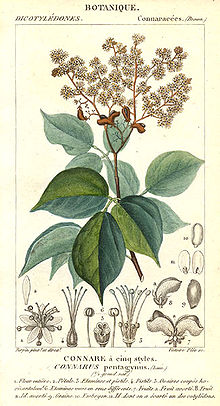Loading AI tools
Family of flowering plants From Wikipedia, the free encyclopedia
Connaraceae is a pan-tropical plant family of 19[4] genera and more than 180 species[5] of largely evergreen trees, woody shrubs and climbers.
| Connaraceae | |
|---|---|
 | |
| Agelaea lamarckii[1] | |
| Scientific classification | |
| Kingdom: | Plantae |
| Clade: | Tracheophytes |
| Clade: | Angiosperms |
| Clade: | Eudicots |
| Clade: | Rosids |
| Order: | Oxalidales |
| Family: | Connaraceae R.Br.[2][3] |
The family was first described by Robert Brown in 1816 and the name has been conserved.[2][3]
Connaraceae is a tropical family, the most important genera of which, Connarus (approximately 80 species) and Rourea (40-70 species) have a pan-tropical distribution.[6]: 107 Their habitat is generally lowland tropical rain forest and savanna.
Connaraceae are typically evergreen trees, shrubs or climbers. Connarus is represented by species in all three lifeforms,[6] while Rourea species are climbers. Their leaves are pinnate, trifoliate or rarely entire, alternate, without stipules and with a pulvinus at the base of the petiole.
Connarus guianensis is economically important for its decorative wood, zebra wood.[7]
Fossil leaflet impression described as Rourea miocaudata from India shows close resemblance to leaflets of the extant Rourea caudata, it has been recorded from the lower part of the Siwalik sediments (Dafla Formation, middle–upper Miocene) of Pinjoli area in West Kameng district, Arunachal Pradesh.[8] Permineralized wood of a stem with the distinctive anatomy of a liana has been described with fossil fruits from a locality in the lower Miocene (19 mya) Cucaracha Formation, where the formation is exposed by the Culebra Cut of the Panama Canal. The anatomy of this fossil wood matches the genus Rourea. Fossil record of Connaraceae is sparse, reliable occurrences indicate that the family originated as early as the late Cretaceous-Paleocene and was widespread by the early Miocene.[9]
Seamless Wikipedia browsing. On steroids.
Every time you click a link to Wikipedia, Wiktionary or Wikiquote in your browser's search results, it will show the modern Wikiwand interface.
Wikiwand extension is a five stars, simple, with minimum permission required to keep your browsing private, safe and transparent.